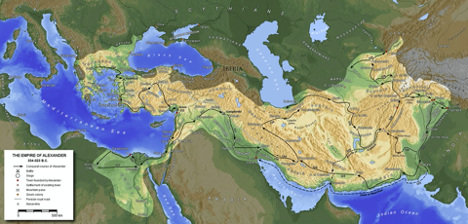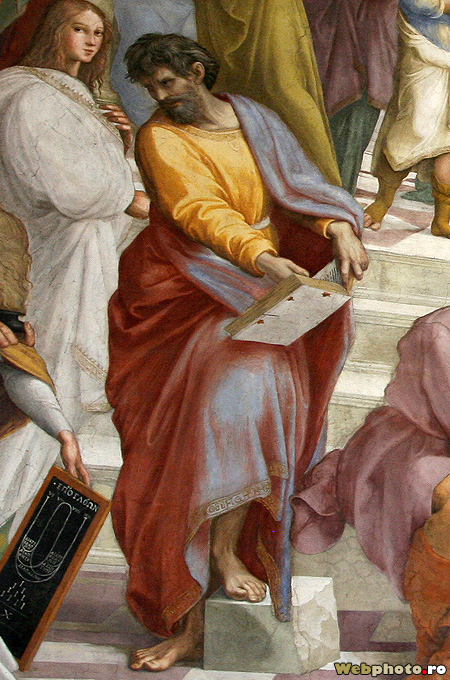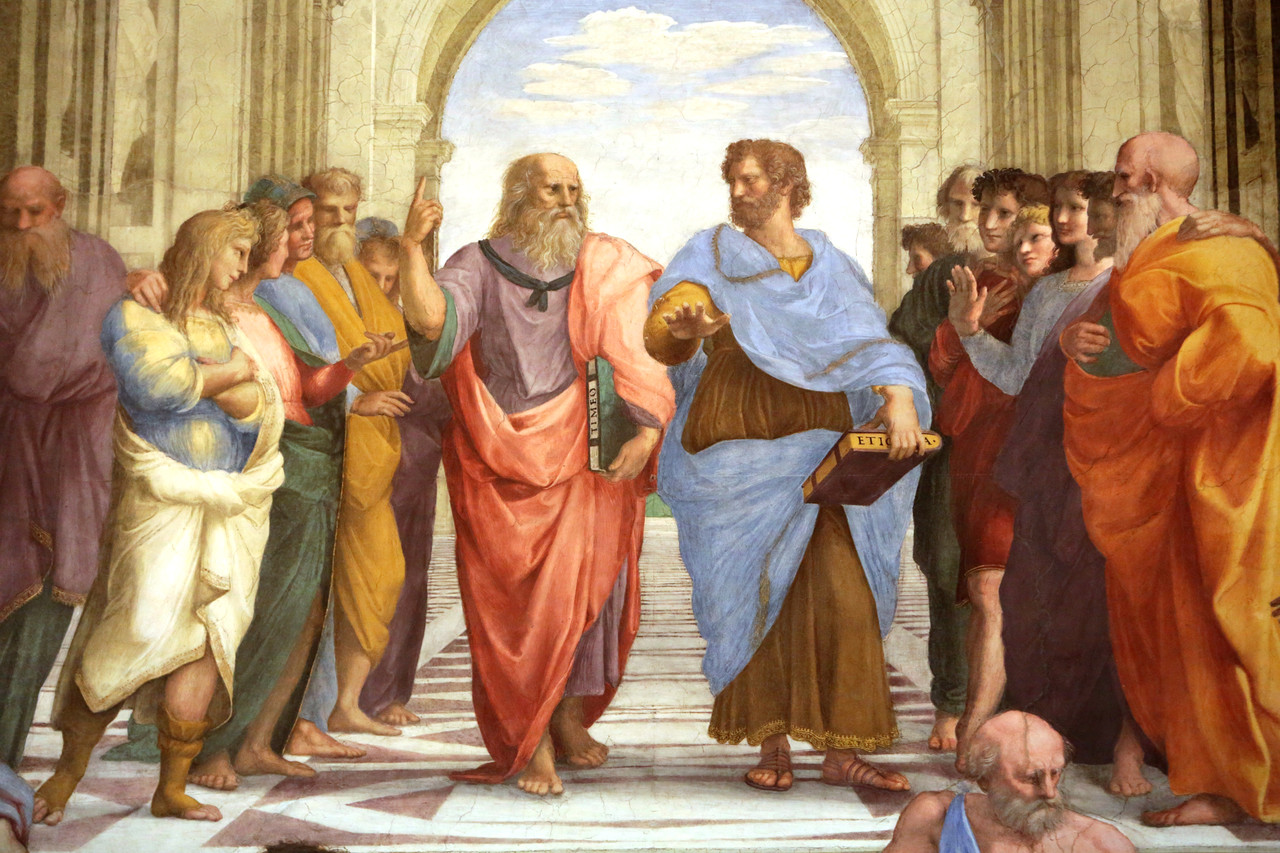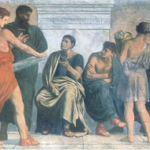Hellenic Theo-Philosophy: From Mythos to Logos
So from what intellectual and socio-political and cultural context did the works and schools of Plato and Aristotle emerge? Where did their ideas come from, even if they are altogether unique in their language, tenets and ideas and even if they were put forth in contrast to, in juxtaposition to, the theo-philosophical traditions which came before them? Hence our need to reach back a century or two before the time of Plato and Aristotle into the minds of the so called “Pre-Socratics”.[1]
During the height of Greek/Hellenic influence in the Mediterranean which begins from the time of Homer and Hesiod in the 8th and 7th centuries BCE, extending and expanding during the reign of Alexander the Great during the end of the 4th century BCE whose imperial expansion broadened the area of Hellenic influence well beyond the Mediterranean to the East into Persia/Iran and as far as the borders of India and established the socio-economic and political infrastructure that provided the basis for the Roman Empire and then the Byzantine Empire which lasted well into the second millennium CE, Hellenic philosophical development took root and evolved in a cultural melting pot that included at the very least Persian (Avestan), Egyptian, Hebrew, and Sumer-Babylonian influences, with perhaps some influence from the traditions of the Indo-Aryans (Vedic) further East. And as this melting pot of cultural and socio-political civilization evolved, the underlying theological and philosophical beliefs of the people in this region evolved along with it.
With the advent of the Macedonian (Greek) Empire stemming from Alexander’s conquests, the spread of Greek culture moved beyond just the areas in and around Athens and the surrounding city-states. Alexander’s empire at its height extended as far south as Thebes in Egypt to as far East as the Indus River in the Indian subcontinent. This imperial conquest enabled Greek culture and thought to spread throughout the ancient Western world, at least definitively into the Tigris-Euphrates Valley, i.e. Mesopotamia, and Upper and Lower Egypt, and to a lesser extent in the Indian subcontinent as well despite Alexander’s failed attempt to conquer the territories east of the Indus River.

Alexander the Great Empire at extent, end of 4th century BCE[2]
The stage of Western metaphysical and theological thought in the ancient Western world after the decline of the influence of Athens/Greece as the cultural and intellectual epicenter in the Mediterranean was marked by a much more cross-cultural context and blend of influences than the tradition which preceded it, a period where traditions developed in a much more insular and isolated fashion due to the more or less isolation of the various different cultures. But it was the Hellenic theo-philosophic tradition more so than any other that dominated intellectual development in the centuries following Plato and Aristotle which took root not only in ancient Greece, but also in the Egyptian territories, the Mesopotamian regions, as well as the Near East (Persia), albeit driven mostly by cultural assimilation forced by military conquest more so than anything else.
Pre-Socratic philosophy is the term modern scholars and academics use to describe the intellectuals and teachers that were responsible for, and preceded, the intellectual developments prior to Socrates (471 – 399 BCE), and in turn Plato (428/427 – 348/347 BCE) and Aristotle (384 – 322 BCE), hence the term. In actuality, some of these so-called Pre-Socratics were actually contemporaries of Socrates himself, so while the classification is somewhat misleading, it does reflect almost all of the modern academic classification of these groups of thinkers and therefore is the term we use here to remain consistent with this literature.[4]
Classical Hellenic philosophy, again in contrast to Pre-Socratic philosophy, represents to modern scholars and academics a period of intellectual development that focuses not just on the rational order and foundational principles of the natural world as distinctive from the theogonic and mythical accounts which preceded it, but also the analysis and exploration of the nature and extent of knowledge itself (epistemology), and how the universe came into being (cosmogony) as described by the fundamental and elemental principles (arche) and their respective interactions and formulations from which the universe as the ancient Hellenic thinkers understood it emerged.
In the end, they developed the rational basis for morality and ethics, the basis of what they referred to as virtue and happiness (eudaimonia), as well as the metaphysical and philosophical foundation of how they believed societies and nation states should be organized and governed. All of these attributes are not only marked characteristics of the intellectual traditions of Plato and Aristotle themselves, but also of all Hellenic philosophical development which succeeded them – as represented not just by the Platonic and Peripatetic schools founded by Plato and Aristotle respectively, but also by the Stoic and Epicurean traditions as well, the latter of which were also very influential in Greco-Roman intellectual and socio-political development.
Some of these so-called “Pre-Socratics” are believed to have written at least one work or text[5] , although others – most notably Pythagoras – are not believed to have written anything themselves. However, what is extant from these works, and what we understand and know about the belief systems which these ancient Pre-Socratic thinkers are believed to have espoused, survive primarily in fragments and quotations from later authors, the primary source of course being Plato and Aristotle themselves who for better or worse cite these figures and their respective belief systems mostly to criticize or counter oppose their ideas against theirs. This is an important point to keep in mind when trying to decipher and understand precisely what these early precursors to the Hellenic philosophical tradition that fall under the broad heading of “Pre-Socratic philosophy” actually thought and taught, namely that most of what we know about them is second hand.
Some of the earliest Pre-Socratics heralded from the so-called “Milesian School” which was “founded” in the 6th century BCE, some century or so before Socrates. Despite the fact that it’s not clear that there was in fact a “school” of philosophy from the Ionian town of Miletus, a city on the Aegean coast of Asia Minor, three of the most influential of the early Greek (Hellenic) philosophers did hail from this city so clearly there must have existed intellectual developments that were specific to that region that fall into the category of what has come to be known as Hellenic philosophy. The three “Milesian” philosophers were Thales (c. 620 – c. 546 BCE), Anaximander (c. 610 – 546 BCE), and Anaximenes (c. 585 – 528 BCE), the latter being considered as either a close friend or student of Anaximander. All three “philosophers” studied, taught and wrote about the nature of the universe and its beginnings (cosmogony), the basic substances of matter and reality and the source of change, i.e. metaphysics and arche, as well as other topics such as Astronomy, geography, biology and politics, altogether representing some of the very first teachers of the Hellenic philosophical intellectual revolution, i.e. “philosophers” (literally “lovers of wisdom”) as the term came to be understood some centuries later.
It is to the linguistic, as well as the archaeological and written evidence of course, that we lean on to support the thesis that at least the Milesians could not help but be influenced by these “Eastern”, or sometimes referred to as “Oriental” theo-philosophical traditions.[6] For the ancient city of Miletus is on the very Eastern edge of what was then Ionia (i.e. Greece), and while they most likely spoke “Greek” in some form or another, they lived just West of the border of the last and perhaps greatest vestiges of what is now referred to as the Assyrian Empire (c. 2500 – 612 BCE).

Neo-Assyrian Empire, 1st half of 1st millennium BCE.[7]
This geographic region that included Egypt and the Middle and Near East, later transformed into an area of primarily Persian influence under the Old of First Persian Empire, aka Achaemenid Empire (550 – 330 BCE) where the predominant theo-philosophical traditions are believed to be what has come to be understood as “Zoroastrian”, typically associated with the term Magi” in the early Hellenic literature (for example Herodotus) as well as Sumer-Babylonian, or “Chaldeans”, all of which carried significant astrological and astronomical connotations.

Achaemenid Empire at its greatest extent Under Darius (522-486 BCE).[8]
The orthodox view that these Pre-Socratic philosophers from the Near East were not influenced directly or indirectly by the Persian and Sumer-Babylonian cultures, and in turn perhaps to a lesser extent by the Indo-Aryan theo-philosophical beliefs which were prevalent in the Indian subcontinent at the time which sat just at the border of the Old Persian (Achaemenid) Empire, is not just naïve but almost racist at some level. While that is not to say that many of their ideas and theories were not altogether unique and revolutionary from an intellectual standpoint, it is simply that outside influences have been historically downplayed in the primarily Western academic literature.[10] In fact fairly strong evidence has been provided for the development of certain ideas – in particular concepts related to mathematics, geometry and Astronomy in particular – from pre-Hellenic civilizations throughout the Near East, North Africa and even as far east as the Indian subcontinent from Sumer-Babylonian, Egyptian and even Indo-Aryan civilizations respectively.[11]
We do know for certain however, that these intellectual developments which fall under the broad and generic heading of the “Pre-Socratics” – of which again we know primarily through the preserved fragments and comments on their systems of belief from later authors – influenced not only Socrates himself, as we understand him through his caricature in Plato’s dialogues within which he plays such a prominent role, but also clearly Plato and Aristotle as well who refer to and speak of the belief systems of their philosophic predecessors, even if again only to malign or criticize them. It is fair to say therefore that these Pre-Socratics, as well as of course the other influential theological and mythical traditions that pre date classical Greek philosophical development (i.e. the intellectual traditions associated with Hesiod, Homer and Orpheus), provide if nothing else the intellectual catalyst and semantic framework for the field of study that has come to be understood as Classical Greek philosophy which has provided us with almost the entire intellectual backbone of all Western thought up until the Enlightenment Era. Such prominent influence in fact that Alfred North Whitehead, a renowned 20th century philosopher and mathematician once wrote, “The safest general characterization of the European philosophical tradition is that it consists of a series of footnotes to Plato.”[12]
So how did these schools of philosophy emerge? What were the social and political factors that allowed them to flourish, establishing the modus operandi and environment of teaching and curriculum which has had such a marked influence on intellectual development in the Western world, developments which are characterized by distinctive Hellenic philosophical traits such as reason” and logic which have survived even into the modern era?[13] The socio-political environment of the ancient Greek city-states, and Athens in particular, was ripe for the flourishing of independent thought for many reasons but it is fair to say that their system of government itself, given that it was not altogether totalitarian, at the very least accepted relatively independent intellectual inquiry and teaching, i.e. philosophy. The proliferation of trade and cultural exchange in the Mediterranean at the time also provided the basis for intellectual development no doubt due to the intermingling and cross-pollination of the various theological belief systems that were prevalent in the region at the time, begging for some sort of assimilation and integration as the cultures and various nation-states merged and conquered each other.
Also, in all likelihood, the very public death of Socrates in Athens roused some sort of pubic empathy (or perhaps better put tolerance) for the pursuit of knowledge for knowledge’s sake throughout the region of Greek influence. That is not to say that these great thinkers did not put themselves in some level of political danger by their “irreligious” and sometimes revolutionary ideas,[14] but clearly there was something unique about the culture of ancient Greece that made for fertile ground for this new discipline of “philosophical” inquiry. Again, the ancient Greeks were not ruled by a king or emperor per se, and as such they had somewhat more latitude to speak freely about their theo-philosophical beliefs than say the priestly classes of the Assyrians, Persians or Egyptians, who were all more tightly controlled by their respective rulers.
Also of note, this time period in antiquity in the Mediterranean was also marked by the advent and increasing spread of the use of (alphabetic) writing as well, something most if not all of the Pre-Socratics took advantage of, with perhaps Pythagoras being the notable exception. This great flourishing of intellectual thought for which the ancient Greek civilization is most known for which had its epicenter in Athens included not just the writings and teachings of Plato as taught in the Academy which he founded in 387 BCE, but also the Peripatetic School founded by Aristotle circa 335 BCE, the Epicurean school at the end of the 4th century BCE (303 BCE), and the Stoic School founded by Zeno of Citium in the early 3rd century BCE (circa 300 BCE).
But the influence of Hellenic philosophy, in particular as reflected in the works of Plato and Aristotle, is not just limited to “philosophical” development alone in the West. The broad based theo-philosophical teachings which fell under the banner of Hellenic philosophy were also heavily leveraged by the early Christian Church Fathers to provide the rational foundations of Christianity – as reflected for example in the works of Philo Judaeus, Origen and Clement of Alexandria all of whom had broad reaching influence on early (Judeo) Christian theology. Even Science itself as we know it today – the disciplines of Physics and logic, mathematics and Astronomy for example – rests upon the very same semantic and intellectual developments that can be found in the works of these early Hellenic philosophers, mainly Aristotle in fact.
The Hellenic theo-philosophical tradition was also leveraged by Arabic theo-philosophical tradition as well, as reflected in the Arabic falṣafa (the Arabic transliteration for the Greek work philosophia) tradition as it came to be defined within the nation of Islam which was established by Muḥammad in the 5th and 6th centuries CE on the Arabian Peninsula. In the Arabic theo-philosophical tradition (sometimes referred to as Muslim philosophy), which arose as a counter balancing force to the spread of Christianity just to the West, many of the Greek philosophical works, in particular the treatises of Aristotle, were translated into Arabic and directly integrated and assimilated into Islamic theology as expressed in the Qurʾān. This was done in order to provide the rational foundations for Islam just as the early Christian Church Fathers used the Hellenic philosophical tradition to provide the rational underpinnings of Christianity (and again Judaism via Philo Judaeus). Hellenic influence spread to the Arabic world via the Byzantine Empire (aka Eastern Roman Empire) which carried on the Greek/Hellenic language and culture after the fall of the Roman Empire in the 5th century CE and held sway over much of North Africa, the Mediterranean and Near East until the middle of the 15th century. This again primarily Aristotelean influence permeated the thought of the early Arabic falṣafa, as is reflected in the influential and lasting theo-philosophical works associated with Al-Kindi, Al-Fârâbî, Avicenna, and Averroes to name but a few of the most influential of the Arabic philosophers.
In fact, many of the ancient Greek texts that we have today would have been lost had it not been for the efforts of this Arabic falṣafa tradition which translated many of the ancient Greek works that would have been otherwise lost in the West into Arabic. In so doing, the falṣafa not only translated these Greek works into Arabic, but also provided running commentaries and expanded upon the theo-philosophical tradition itself along the way, developing a distinctive and influential in and of itself (and characteristically Arabic in language and culture) philosophical tradition that in some sense picked up where the Hellenic philosophical tradition left off after it was effectively abolished by the onslaught of Christianity and destruction of “pagan” belief systems and literature in the 4th and 5th centuries CE in the area of Roman/Latin influence in the Mediterranean.
This Hellenic intellectual revolution, if we can call it that, rivalled if not dwarfs in importance, relevance and influence the Scientific Revolution of the 16th and 17th centuries with respect to its overall impact on not just the worldview of the peoples in the Mediterranean that came under Greek influence in the succeeding centuries, but also a worldview that was adopted by the Latin/Romans and spread throughout the Roman (and Byzantine Empire) until it was ultimately replaced by Christianity, and then Islam to the East, in the 4th, 5th and 6th centuries CE and the worldview which underpins virtually all theological, intellectual, metaphysical and scientific thought in the West, whether we recognize it or not. These developments represented no less than a radical transformation of how the world was viewed, as well as how the world was to be looked upon, studied and understood – a system of rational order, i.e. Logos, which could be explored and deduced from discernible facts along with refined techniques of reasoning and logic.
These principles were not just a marked characteristic of Hellenic philosophy proper as we understand it through the teachings of Plato, Aristotle, Epicurus and the Stoics for example, but also were the basis of Aristotle’s works on logic which circulated in antiquity under the title of the Organon and were used through the Middle Ages as the basis for the teaching of reason and logic in and of themselves, but were also the very same principles upon which perhaps the most influential mathematical treatise of all time, Euclid’s Elements, was authored.
During this era of radical intellectual upheaval – one that in fact had an almost direct corollary intellectual counterpart to the East at around the same time – the disciplines of physics, Astronomy, medicine, logic and mathematics were created all under the broad heading of “philosophy”, and all of which were taught in some form or another at these various “schools” of philosophy which were established after Plato and Aristotle had laid the primary intellectual foundations so to speak, and which in turn fueled each other forward intellectually in these various disciplines which again were all considered to fall under the broad heading of philosophia together with theology and first philosophy. These developments stemmed from, or at the very least ran parallel to, not necessarily an altogether dismissal of the religious practices and beliefs of their ancestors, but at the very least a reclassification of the mythical and mystery cult traditions that had preceded them – i.e. from mythos to Logos.
For example the Theogony of Hesiod, Homer’s epic poetry, the Orphic mystery cults and practices, even the historical work of Herodotus, all of which of which basically dominated the cultural, intellectual and theological landscape of Greece before the classical era, were not altogether abandoned or rejected as works of little or no value in the pursuit of knowledge (although according to some early philosophers they were looked down upon somewhat as for example with Heraclitus and Aristotle), they were re-categorized by the early philosophers in a sense into an altogether different branch of knowledge, different from philosophy per se that was considered to have a more pure rational foundation – not empirical just quite yet but certainly Aristotle laid the groundwork for empiricism with his doctrine of substantial form.
This re-classification of knowledge was a byproduct of this creation of an altogether new branch of knowledge in fact, i.e. philosophia. Myth, ritual and ceremonial worship, and almost all of what we would consider today theological or religious study, which arguably had dominated the intellectual landscape of humanity since the dawn of man, was relegated into a domain of study that did not lack value necessarily, but one that did not, could not, provide the same unique value proposition of philosophy given its rational (logos) foundations. Mythos, as we refer to it throughout, which reflected the and the firm conviction of the underlying order of the cosmos, driven by some divine hand as it were, is in fact perhaps the only consistent theme of all creation narratives that underpinned all the advanced civilizations that sprang up in Eurasia (North Africa, the Mediterranean, the Middle East, Near East, India and the Far East/China) from say 5000 BCE to 500 BCE – driving this new intellectual revolution which pivoted away from mythos to Logos – with reason and logic becoming the focus of the ancient mind supplanting myth, ritual and worship to a large extent. In turn, this new metaphysical and philosophical domain eventually gave way in the first few centuries CE (Anno Domini, the year of the Lord) to the establishment of religion in the West as we know it today. Jesus in antiquity by the early Christian Church Fathers is viewed as the divine personification of Logos in fact, providing the rational and theological underpinnings to Christianity, effectively fully adopting and integrating the Hellenic philosophical tradition, that came to form the doctrine of the Trinity.
But in classical Greek antiquity, and in fact in the Far East in antiquity as well, philosophy came to represent the pursuit of wisdom on its own grounds, what we would call today the scientific inquiry into the true nature “reality” and upon which interestingly rested the basic fundamental principles of the good, happy and virtuous life (eudaimonia). For to the ancients, the earliest civilizations that were established across Eurasia as they evolved in the latter part of the first millennium BCE, philosophy was a practical art that was co-opted by the aristocrats and rulers of these peoples. It became an essential discipline upon which the guiding principles of a well-functioning and healthy society – which rested upon the well-functioning and healthy individual – were established. This became really the guiding force of almost all of the philosophical schools of thought that were established during this “Classical Era”, one that again was marked by this pivot from mythos to Logos. This intellectual revolution held sway over the Mediterranean and Near East for some thousand years until it was supplanted by Christianity and Islam, and in the Far East for another millennium more which although was heavily influenced by Buddhism, nonetheless held fast to the ancient philosophical systems of classical antiquity – namely Confucianism and Daoism.
These schools of thought as a whole did not altogether reject the worship and reverence, or even existence, of the old pantheon of gods, or ancestors as the case may have been, however. And they most certainly – at least in the West – did not deny the import of the temples of worship where these ancient belief systems continued to be taught and practiced, and where the various ceremonies and rituals to these gods were performed. These ceremonies and rituals reached far back into pre-history no doubt, and they continued to be respected in one way or another by the various philosophical schools that emerged in the area of Hellenic influence until they were ultimately banned, along with all “pagan” religious practices, in the Roman Empire dominion toward the end of the 4th century CE.
For example, the Temple of Apollo at Delphi, was arguably the most sacred of all the sites in the ancient Greek world, first constructed in the early part of the 7th century BCE at the very beginning of Hellenic influence in the Mediterranean, and more or less held significant holy stature to the Greco-Roman society until the beginning of the 4th century CE when Christianity became the official state religion of the Roman Empire, and pagan rituals and practices, of which the worship of Apollo at Delphi was one, were banned. It was the Oracle at this temple in fact, according to Plato[15], that Socrates was declared the wisest man in Greece, helping to usher in the new era, an era which was founded upon Socrates’s search for true wisdom which became the distinguishing mark of philosophy in antiquity. The Temple at Delphi was also where Plutarch, perhaps the most influential and prominent thinker of the Middle Platonist era, wrote his Parallel Lives and Moralia treatises, among other significant ancient theo-philosophical works, and where he spent the last 30 years of his life as a priest, speaking directly to the symbiotic and close relationship that existed between philosophy and theology in the Hellenic world.
Even in the Epicurean worldview, the most materialist and atheistic of the Hellenic philosophical schools, the claim was made that even if the gods did exist, they were not, nor should they be, concerned with human affairs, hence the need for, and ultimately value of, the creation of systemic rational belief system from which a set of guiding rules related to morality and ethics could be deduced as it were. These principles, based again upon what was considered to be a purely rational method of inquiry (logos) established the groundwork for ethics, from which rules and guidelines and practices for the living of a happy and fulfilling life (eudaimonia), which ultimately was a virtuous one (arête), were deduced. These guidelines then, if followed by individuals and citizens of the state as a whole, should lead to a well-functioning, stable and just society. This was the “purpose” of Hellenic philosophy from a socio-political perspective, and in fact was the purpose of philosophical inquiry in the Far East as well which saw similar cultural and social factors at work which drove parallel intellectual innovations.
For philosophy in antiquity in the Hellenic world was designed not only to help people understand the nature of the universe, the kosmos as it were (cosmogony), but also evolved into a system of belief surrounding the essential nature of world – metaphysics as it were. These systems of belief, these theo-philosophical systems that evolved over centuries and came to have such a lasting influence on intellectual developments throughout all of the Eastern and Western world, were constructed and developed primarily for the purpose of understanding, and providing the rational foundations, upon which knowledge itself came to be defined. This helped establish the foundation of ethics, but also the model of the ideal state. This is the content and purpose of Plato’s seminal works the Republic and Laws, Aristotle’s Nicomachean Ethics and Politics, Lǎozǐ’s Dàodé Jīng, the Analects of Confucius, and the Laws of Manu which provide the moral and ethical foundations of Hindu culture, all texts which were written within 300 or 400 years of each other throughout Eurasian antiquity from roughly 500 BCE to 200 BCE.
The gap of 8 or 9 centuries between the Ancient Greek contributions to philosophy until Christianity gained traction and adoption in the Western world illustrates just how broad and far reaching an influence the Ancient Greek philosophers had on the development of the Western mind and even on Western civilization as a whole given the broad scope of the topics covered in the domain of philosophy – from physics to theology to ethics to Astronomy. Christianity in fact, a tradition which had its own unique underlying mythos and cosmogony which bears close resemblance and association with the religions of the Hebrews and the Persians, borrowed from, or from a different perspective superimposed upon, the philosophical and metaphysical systems of the Ancient Greeks.
It was not until many centuries, and even millennia later, not until the power of the Church and the associated threat of persecution for non-believers in the Western word began to wane, that the work of Plato and Aristotle could begin again to be expanded upon and drawn from in a purely metaphysical, and even scientific, context and it could break free from the bondage of pure religion, an era that ushered in the end of the Dark Ages and the beginning of the Enlightenment Era and the Scientific Revolution in the West.
[1] While I am not a fan of the term “Pre-Socratics”, it is used so widely in the academic and scholarly literature to describe these group of thinkers from around the Mediterranean prior to Socrates that coming up with a new term would be altogether confusing and inconsistent with the rest of the literature on the topic. Also, the term itself has been criticized and analyzed by many other scholars and academics and there is no reason to repeat those arguments here. For a review of the use of the term as well as the intellectual developments in and around the Mediterranean from the 6th century BCE onwards up until the time of Socrates (471 – 399 BCE) that typically fall under this broad heading, see the “Introduction” chapter in the Oxford Handbook of Presocratic Philosophy edited by Patricia Curd and Daniel W. Graham, Oxford University Press 2008.
[2] From Wikipedia contributors, ‘Alexander the Great’, Wikipedia, The Free Encyclopedia, 28 October 2016, 17:38 UTC, <https://en.wikipedia.org/w/index.php?title=Alexander_the_Great&oldid=746647937> [accessed 28 October 2016]
[3] The Edict of Milan in 313 CE established the legality and tolerance of Christianity within the Roman Empire. The Edict of Thessalonica in 380 CE, also known as the Cunctos populous, made Christianity the official religion of the Roman Empire, ordering all the subjects therein to profess the faith of the bishops of Rome and Alexandria as established by the Nicene Creed in 325 CE.
[4] The Pre-Socratic philosophical tradition for example, as it has come to be understood by modern classicists, does not include the works and literary traditions associated with Homer and Hesiod, nor do they include “Orphic” mythos either, despite the fact that these traditions, and the underlying theological beliefs (i.e. again mythos) which they reflect, did significantly influence early “Hellenic” intellectual developments even if they were only used as examples of what “philosophy” was not by the early Hellenic philosophers.
[5] For example, Parmenides of Elea (southern Italy) is believed to have authored a lyric poem in hexameter verse referred to as On Nature of which significant fragments survive. Heraclitus is believed to have written a book of the same title that he (according to Diogenes Laertius) donated to the temple Artemis in Ephesus (modern Turkey). For a review of the philosophy of Parmenides and an analysis of his work, or again the fragments which survive of his work, see https://snowconesdiaries.com/2016/09/30/parmenides-of-elea-what-is-versus-what-is-not/.
[6] See the Chapters in this work on the Source of Hellenic philosophy and Indo-European philosophy for a detailed treatment of the topic of “Oriental”, or “Eastern” influences of early Greek philosophy.
[7]Neo-Assyrian Empire (911 – 605 BCE). From Wikipedia contributors, ‘Neo-Assyrian Empire’, Wikipedia, The Free Encyclopedia, 19 October 2016, 18:15 UTC, <https://en.wikipedia.org/w/index.php?title=Neo-Assyrian_Empire&oldid=745176770> [accessed 19 October 2016].
[8] Under the reign of Darius I, 522 – 486 BCE. From Wikipedia contributors, ‘Achaemenid Empire’, Wikipedia, The Free Encyclopedia, 26 October 2016, 09:00 UTC, <https://en.wikipedia.org/w/index.php?title=Achaemenid_Empire&oldid=746264420> [accessed 26 October 2016].
[9] It is these empires and spheres of political influence in fact which provided the socio-political foundations for not just the great Greco-Persian wars of the middle of the first millennium BCE which are such a core part of classical Greek (Western) history, but also the impetus and socio-political foundations for the great conquests of Alexander the Great in the 4th century BCE which was to have such a lasting influence on Western culture and provided the basis for the Roman Empire which succeeded it/him.
[10] A good summary of the topic of “non-Greek” origins of Hellenic philosophy can be found in the Chapter entitled “Prehistory of Presocratic Philosophy in an Orientalizing Context” authored by Walter Burkert, a former German professor of classics at the University of Zurich, Switzerland who was a renowned scholar of Greek mythology mystery cults. See the Oxford Handbook of Presocratic Philosophy, edited by Patricia Curd and Daniel W. Graham. Oxford University Press, 2008. Chapter 2, pages 55-85.
[11] See for example the article by Frits Staal entitled “Greek and Vedic Geometry” which theorizes a common origin of Greek and Vedic mathematics, and by extension theology and philosophy. “Greek and Vedic Geometry” by Frits Staal. Published in the Journal of Indian Philosophy in 1999 by Kluwer Academic Publishers. Vol. 27, No. 1/2, pp. 105-127.
[12] Process and Reality by Alfred North Whitehead. Free Press, 1979. Pg. 39.
[13] The term academia itself derives directly from the name of the school which Plato established (c. 387 BCE) in Athens toward the end of his life, i.e. The Academy.
[14] For example, in 323 BCE after Alexander the Great died, a former pupil of Aristotle, the Assembly of Athens declared was against Alexander’s successor and since Aristotle was considered pro-Macedonian given his ties to Macedon, he went into voluntary exile where he died in 322 BCE at the age of 63. See http://ancienthistory.about.com/cs/people/p/aristotle.htm
[15] Plato’s Apology 21a-d










Leave a Reply
Want to join the discussion?Feel free to contribute!